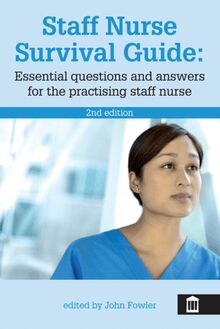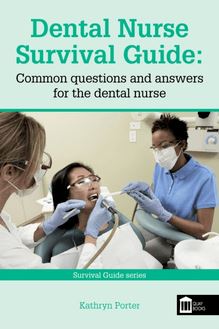Staff Nurse Survival Guide , livre ebook
173
pages
English
Ebooks
2012
Vous pourrez modifier la taille du texte de cet ouvrage
Obtenez un accès à la bibliothèque pour le consulter en ligne En savoir plus
Découvre YouScribe et accède à tout notre catalogue !
Découvre YouScribe et accède à tout notre catalogue !
173
pages
English
Ebooks
2012
Vous pourrez modifier la taille du texte de cet ouvrage
Obtenez un accès à la bibliothèque pour le consulter en ligne En savoir plus
Publié par
Date de parution
12 juillet 2012
Nombre de lectures
0
EAN13
9781856425001
Langue
English
Title Page
Staff Nurse Survival Guide
2nd Edition
Edited by
John Fowler
Publisher Information
First published in the UK by Quay Books Division, MA Healthcare Ltd, St Jude’s Church, Dulwich Road, London SE24 0PB
Digital edition converted and distributed in 2012 by
Andrews UK Limited
www.andrewsuk.com
© MA Healthcare Limited 2010
All rights reserved. No part of this publication may be reproduced, stored in a retrieval system or transmitted in any form or by any means, electronic, mechanical, photocopying, recording or otherwise, without prior permission from the publishers
Introduction to the 1st Edition
More than 25 years ago, when I was a junior nurse, one of the most useful books I ever bought was a blank notebook in which I wrote notes and procedures on what to do in certain situations. It is not possible to know how to do everything when you are newly qualified, nor is it possible to carry around a complete set of textbooks for quick reference, hence the idea for this book - a pocket-sized handbook containing ideas, principles and guidelines for a number of common and sometimes unexpected situations that you will probably meet in your first year of practice.
I recently had the privilege of working with a group of clinically based practice development nurses, and discussed with them the possibility of writing such a handbook. They were enthusiastic and wanted to take it on as a project. We collected together all the common situations that a newly qualified staff nurse might face, and then volunteered ourselves, or someone else, to write the answers. The result is this guide: more than 70 questions with answers from 14 different specialists. We aimed to produce an answer for each question that could be read in five minutes. This obviously limited the amount of information and rationale that we could include. If you wish to explore any of the subjects in greater depth, you will need to access specialist textbooks. Quay Books is currently producing a complete series of Fundamental Aspects of Nursing Practice , which is aimed at senior students and staff nurses.
This book is intended to be a useful handbook for everyday use - do not leave it on your bookshelf in your room. Keep it on the ward, where you can access it easily. At the end of each chapter there is a blank page for you to add useful local information, such as the telephone number of the infection control nurse, or your own notes on a particular procedure. Add notes to this book and make it your own resource. I was asked a question recently by a newly qualified nurse - one that does not appear in this book. It was: ‘How can I be a really good nurse?’ My answer was simple: ‘Find a really good role model and learn from him or her.’ I hope you want to be a really good nurse: although it is a difficult job, it is one of the most rewarding careers that anyone can have. Work to the best of your ability, work with enthusiasm, listen to your patients and learn from them. Good luck in your nursing career. I hope you find this handbook useful.
Many thanks to all the contributors for their willingness to share their knowledge and experience in the production of this handbook.
John Fowler
De Montfort University
Leicester 2005
Introduction to the 2 nd Edition
I still remember the first few months of my life as a staff nurse, too many years ago to recount! They were one of the most rewarding, yet scary times of my nursing career. Rewarding because all those years of training were now being put into practice. I was given respect, authority, responsibility and, not the least, more pay! And scary for all the same reasons. Looking back I am so grateful to my first ward sister and the other two staff nurses on that ward. I probably did not appreciate at the time how much they supported me, encouraged me and guided me in my early nursing career. Such is the personality of youth, we often to not see and appreciate those around us that are going out of their way to help us. Over the 30 plus years that I have been a nurse I have tried to return some of that support and guidance that was so generously given to me. I hope that this small book is in some way a help to you as you begin your nursing career. Many people have commented how useful they found the first edition and I’m grateful to all the contributors who have yet again given of their time to update and add new sections to this handy little book.
John Fowler
De Montfort University
Leicester 2010
Contributors
Claire Agnew RN(Adult), DipHE Nursing, PGCE, ENB124, ENB 998, Senior Nurse Clinical Practice Development, University of Leicester Hospitals NHS Trust, Leicester
Flo Brett RGN, Previously Clinical Governance Manager, University Hospitals of Leicester NHS Trust, Leicester
Nicola Brooks PG Dip. BSc (Hons), DipHE Nursing, RN, ENB998, ENB931, Senior Lecturer - Adult Nursing, School of Nursing and Midwifery, De Montfort University, Leicester
Deborah Dowsett MA BA(Hons) DPSN RGN, Senior Lecturer - Nursing, School of Nursing and Midwifery, De Montfort University, Leicester
John Fowler PhD MA, BA, DipN, CertED, RGN, RMN, RCNT, RNT, Principal Lecturer - Nursing, School of Nursing and Midwifery, De Montfort University, Leicester
Martyn Geary MA, BA(Hons), RGN, PGCE(FAHE), Senior Lecturer - Palliative Care, School of Nursing and Midwifery, De Montfort University, Leicester
Nigel Goodrich BSc (Hons), DMS, RGN, RMN, Principal Lecturer, School of Nursing and Midwifery, De Montfort University, Leicester
Penny Harrison MA, BSc (Hons), RGN, FETC, CertEd, ENB100, Senior Lecturer - Adult Nursing, School of Nursing and Midwifery, De Montfort University, Leicester
Martin Hopkins MSc BA(Hons) PGCE DipHE RN(Adult), Senior Lecturer, School of Nursing and Midwifery, De Montfort University, Leicester
Karen Jackson BSc (Hons), PG Dip, MMedSci, RGN, RSCN, Senior Lecturer - Children’s Nursing, School of Nursing and Midwifery, De Montfort University, Leicester
Tracey Kemmett BSc RGN, Previously Senior Nurse, University Hospitals of Leicester HNS Trust, Leicester
Annie Law MA, PGDAdEd, BA(Hons) DPNS, RGN, RNT, ENB100, N59, ENB931, N14, Practioner/Lecturer, Directorate of Cancer Services and Clinical Haematology, University Hospitals of Leicester NHS Trust, Leicester
Paul Pleasance EdD, MEd, RGN, ITUCert, PGCE, RNT, ILTM, Head of Quality, Faculty of Health and Life Sciences, De Montfort University, Leicester
Kevin Power MA, BA(Hons), Dip(N), CertEd, RSCN, RGN, Associate Head of School, School of Nursing and Midwifery, De Montfort University, Leicester
Paul Rigby MA, BA(Hons), DipN, DipAdEd, Dip PSI (THORN) RMN, Senior Lecturer - Mental Health, De Montfort University, Leicester
Wendy Taylor BSc (Hons), RGN, In Patient Service Manager - Palliative Care, The Leicestershire and Rutland Hospice, Leicester
Keith Todd RGN, CertEd, ENB199, Senior Lecturer, School of Nursing and Midwifery, De Montfort University, Leicester
Penny Tremayne MSc, PGDE, BSc (Hons), DipN, RGN, Senior Lecturer - Adult Nursing, School of Nursing and Midwifery, De Montfort University, Leicester
Zoe Wilkes MSc BSc (Hons), RGN, RSCN, Assistant Service Manager, Children’s Community and Palliative Care Services, Leicester City PCT
Chapter 1
Dealing with the unexpected How do I deal with difficult questions? How do I deal with complaints? How do I deal with aggressive patients or relatives? What is involved in incident reporting? What are my responsibilities in reporting malpractice? What can I do about bullying within the organisation? What do I do if a patient wants to self-discharge? How do I deal with healthcare associated infections?
How do I deal with difficult questions?
Kevin Power
Difficult questions probably fall into two categories: those to which you do not know the answer and those that you are not sure how to answer. The first type is probably relatively easy to deal with. Being honest and telling the questioner that you do not know the answer is the best response. Trying to bluff an answer is fraught with difficulty, as it is always likely that you will be caught out. Many newly qualified staff nurses perceive that other people expect them to ‘know everything’ because they are qualified, regardless of the length of their experience (Lathlean, 1987; Shand, 1987; Power, 1996; Charnley, 1999; Whitehead 2001). It is also clear that this phenomenon is not restricted to the UK (Cowin and Hengstberger-Sims, 2006). However, it is unreasonable to expect anyone to know the answer to all the questions that may be asked. There should be no shame in admitting that you are temporarily at a loss for an answer. Obviously you will promise to find out the answer or find someone who can give that answer, and it is important to keep that promise.
The second type of difficult question is altogether more challenging. This type of question may fall into one of two categories. The answer may be rather complex and the difficulty here is making sure that your explanation is easily understood by the questioner. The best way to approach such situations is to build up a personal ‘thesaurus’ of everyday words that mean the same as or explain technical jargon. For example, a patient may ask what a lesion is, as the doctor mentioned this to them. This word can have a variety of meanings, ranging from an innocent wart to a potentially devastating cancer.
Case study 1
Amit Shah had recently been diagnosed as having leukaemia. He said to the nurse caring for him that the doctor had explained the disease to him but he did not really understand what the doctor was say

